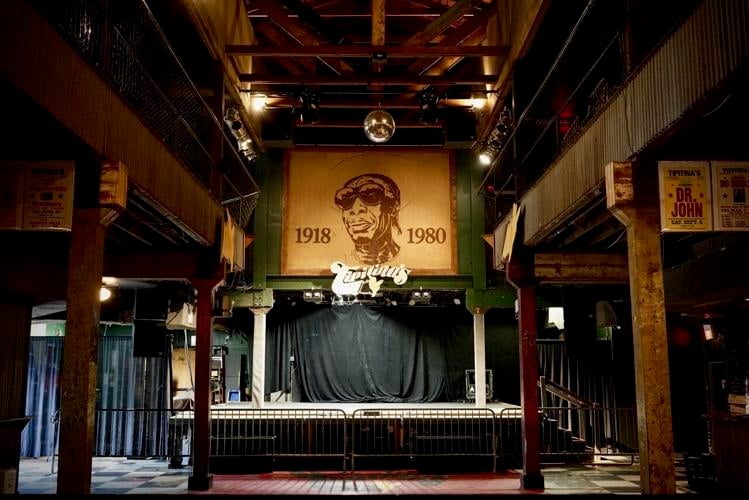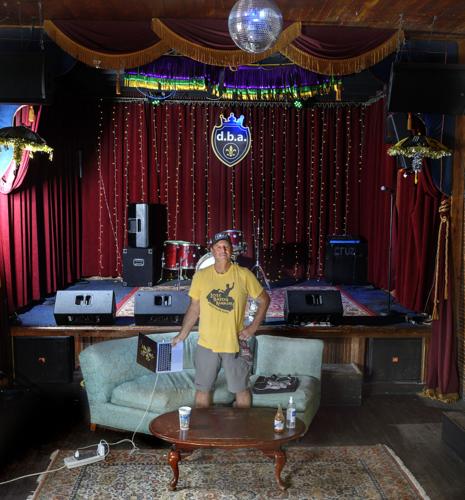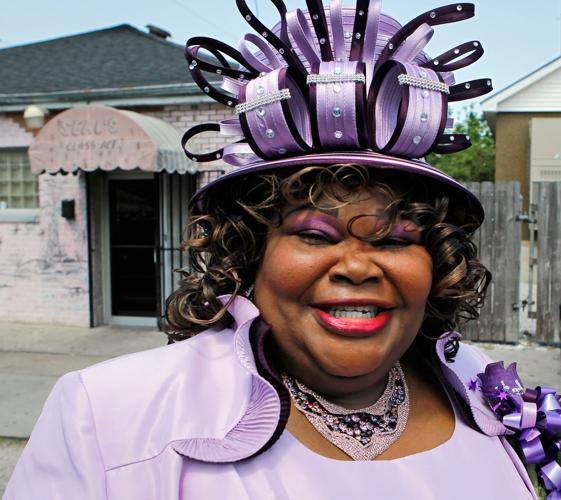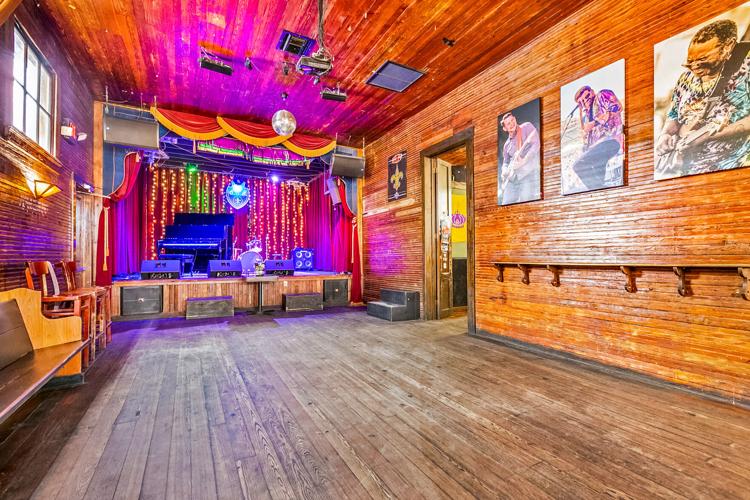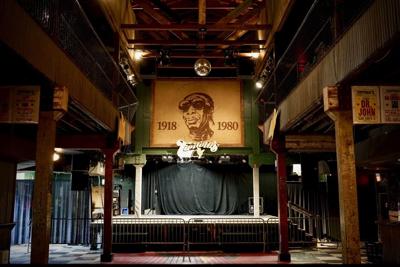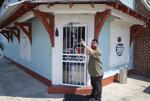Before the pandemic turned off the PA systems at New Orleans bars and live music venues, Rollin “Bullet” Garcia Sr. was rotating five different bands on Sundays, filling Thursdays with Shamarr Allen and other jazz musicians, and booking The Original Pinettes Brass Band on Friday nights at his bar.
After more than 20 years, it’s become a key venue for New Orleans music in the neighborhood and the city at large, giving up-and-coming acts a shot to strut their stuff and established musicians a chance to let loose, far from the bustle of the Quarter and Frenchmen Street.
“I’ll give a young group a chance that nobody else probably would,” Garcia says. “I’ve had a lot of New Orleans greats play at my place. I’ve had people that come in [to play clubs in] the French Quarter and knew Kermit [Ruffins] and things like that and drop in and sit in.”

Rollin 'Bullet' Garcia stands at the front door of his business, Bullet's Sports Bar, as he waves to a neighbor in a passing car.
Like venues across the city, however, Bullet’s stage has been quiet since March. At first, “I wasn’t worried,” Garcia says. But after more than six months, that’s starting to change. Although Mayor LaToya Cantrell this week announced the city would begin a phased reopening of bars — the second time New Orleans has tried to reopen bars — he has little faith. The announcement is “a crock of bull,” Garcia says bluntly.
He argues the plan to allow bars to initially sell go-cups will only help high-volume tourist bars in the Quarter, and even when bars can begin serving customers indoors again, occupancy rules will likely make it economically unworkable. Though it’s technically possible to put on socially distanced shows, the money just doesn’t add up. "You would have to charge maybe $20 a head, because after you get the people in there at social distance, you can’t make money with it,” he says.
Garcia isn’t alone. Bar and music venue owners across the city have become increasingly concerned they are being left behind by government officials at all levels, particularly Black-owned neighborhood venues like Bullet’s, which have been the backbone of New Orleans’ music culture for decades.
The situation is nearing a tipping point, owners and community activists say, warning the city’s music landscape could be fundamentally changed if steps aren’t taken to keep these venues alive now.
New Orleans’ “cumulative magic is under siege,” says The Ella Project co-founder Ashlye Keaton. “And we are endangered. That’s going to impact the quality of life for the whole community and impact the ability to draw in tourism dollars.”

A hand-made sign by Rollin 'Bullet' Garcia on the front of his Seventh Ward business, Bullet's Sports Bar
Few industries have been hit harder by the economic impacts of the coronavirus pandemic than live music, particularly at small independent venues. Overnight, thousands of clubs and bars that host music across the country went dark in March as the virus spread, putting employees, owners and performers out of work. And given that the virus spreads easily in confined spaces, it’s unlikely any sort of “normal” will return for music venues for at least another year.
Already operating on tight margins, it's likely many venues will never reopen. “How these venues are able to exist are by basically having as many people in the room as the fire marshal will allow,” says Audrey Fix Shaefer, a spokesperson for the National Independent Venue Association and for several music venues, including Washington, D.C.’s 9:30 Club. NIVA launched in April in order to lobby for independent venues, including more than 25 in the New Orleans area, such as Tipitina’s, d.b.a., and The Spotted Cat.
“Often ticket sales, generally, almost all of that goes to the artists,” Shaefer says, “Where we’re able to make our mortgage is by having people come through the door, feeding them, serving them drinks and having them buy merchandise.”
“I personally don’t understand how we can plan ahead for anything,” says Kallie Tiffau, who books shows at Banks Street Bar in Mid-City. “Everything seems uncertain. Also doing things that incentivize people to gather personally feels bad for me.”
So far, most venues have been able to hold on, though a small number have closed. Techno Club in June announced it was permanently closing its physical venue, followed by Gasa Gasa announcing it was closing its doors in July.
Gasa Gasa, the Freret Street music venue, is for sale, a casualty of the coronavirus pandemic which has stretched music venues into precarious…
And, without help it’s easy to see that number could quickly grow.
The damage to Black-owned bars could be particularly severe. Just as the coronavirus has had a disproportionate impact on the Black community’s physical health due to systemic issues like access to healthcare and pollution, its economic effects have been exacerbated by longstanding structural disparities.
Historically, Black-owned New Orleans bars, which cater to a local clientele often made up of residents who live near the venues, haven’t received the same amount of attention as some white-owned, tourist-frequented clubs.
For example, Garcia points to how cameras during breaks in Saints games will air certain, well-known bars over others. That’s meant less attention from government leaders who often prioritize the tourist industry over other sectors. That can mean everything from emergency grant programs to simply having a seat at the planning table simply aren’t available to Black business owners.
Black-owned businesses in the past also haven’t had the same access to resources such as loans, financial information, business counseling or tools, says Cecile Dalton, the owner of Seal’s Class Act in the7th Ward. Even when the country isn’t being ravaged by a pandemic, “the resources are not there for us,” Dalton says.
The lack of structural support for Black-owned businesses has long meant that even in an industry which operates on the margins, like the live entertainment sector, they are more vulnerable than others. And the coronavirus has only made that worse.

Sportsman's Corner bar in Central City
Before it closed on March 15, Seal’s Class Act hosted live entertainment every Friday and Sunday, including featuring singer Lisa Amos and the Treme Brass Band. Most nights with music it was jam-packed, with people calling ahead to reserve tables, Dalton says.

Cecile 'Seal' Dalton owns the bar and music venue Seal's Class Act, which she started in the Seventh Ward more than 20 years ago.
At the beginning of March, Dalton took sick and was in the hospital for eight days. And then COVID forced her to close her bar, leaving her and her business without income. “So it’s been a roller coaster for me,” she says, “but through the strength of God, it’s been one day at a time.”
Seal's Class Act, which caters to a 35 and older crowd, plans to reopen Thursday for to-go service only.
Dalton has applied for an SBA loan, but the Small Business Administration couldn’t verify her business, she says. Through her accountant, she submitted a reconsideration letter and is now waiting to hear back. “What more is not verifiable” about her business, she asks. “I don’t know. It is frustrating.”
It’s a familiar situation for Steven Elloie, who inherited Sportsman’s Corner in Central City from his mother Theresa in late March. Elloie’s mother was something of a legend in Central City, not only for her popular bar but also the beautiful, detailed corsages she would make for social aid and pleasure clubs, birthday parties, weddings and Saints games.

Steven Elloie owns the Central City bar Sportsman's Corner
Before the pandemic, the Elloies were in the process of transferring Sportsman’s Corner from her ownership to his. But within weeks of the pandemic hitting New Orleans his mother became one of its first victims.
With offices closed or short-staffed because of the pandemic, or from complications arising from Theresa’s death, it's been difficult to get the transfer completed. That, in turn, has made the process of applying for grants, like through the Louisiana Main Street Recovery Program, while the bar has been closed more difficult. “It is a complicated situation,” Elloie says.
“At the end of the day, being in business, besides being a Black-owned business, I just think we all need to be able to operate at 25% capacity, just like restaurants, or we should be able to operate at curbside. The fact is we have bills, just like restaurants — just like City Hall has bills.”

Kallie Tiffau, in plaid pants, and their band Gland perform inside Banks Street Bar. Tiffau also books show at the Mid-City neighborhood bar and venue, which has been closed during the pandemic.
While other industries have been given tax breaks and direct financial relief from Congress and state governments, the live music industry has gone largely ignored by lawmakers. Among the legislation before Congress currently backed by NIVA are the Save Our Stages Act, a bipartisan bill — without Sen. John Neely Kennedy’s support — which would establish a $10 billion grant program for live venue owners, and the RESTART Act, which gives the Paycheck Protection Program more flexibility. The outlook on those pieces of legislation are grim, with the Senate more concerned about confirming a new Supreme Court Justice than addressing a new federal relief plan.
City officials, so far, have done little in the way of helping venues — and in some ways understandably so. Cantrell and city health officials were faced with one of the country’s largest initial outbreaks of the virus this spring. In response they’ve taken a conservative approach, including maintaining stricter rules even when the rest of the state has moved forward in reopening.
The city has also been particularly focused on the reopening of schools. That has come with its own set of challenges and has been a much slower process than many had hoped. But it seems to have paid off: infection rates have not forced in-person schooling to be called off as some had feared, and so far students have not become the source of significant community outbreaks.
Kelder Summers opened her cocktail lounge Whiskey & Sticks two years ago as a new addition to a long-running tradition in New Orleans — th…
Still, Cantrell’s resistance to letting bars and music venues open has been notable and appears to be driven at least in part by how some bar owners have reacted to the rules. For instance, when she first moved to cancel St Patrick’s Day celebrations in March, a handful of establishments hosted huge street parties, most notably Tracey’s Original Irish Channel Bar. Hundreds of revelers openly flaunted her efforts to limit large gatherings, and video of the party went viral. Within days, Cantrell shut down all bars in the city, shortly followed by a city-wide lockdown.
Similarly, when the city briefly allowed bars to reopen, masking and social distancing enforcement by bars was, at best, lax. Bourbon Street quickly became an unmitigated disaster, and infection rates began to spike, bringing the short-lived experiment to an end — and was later followed by an unprecedented ban on the sale of go-cups city-wide.
Still, given the central role music and bars play not only in the lives of New Orleanians but also its image as a “destination city” for tourists, the lack of assistance has frustrated owners: a fact Cantrell tacitly acknowledged Wednesday when she announced the city would start showing bars “a little love” under the Phase 3 rules. But even when fully implemented, Phase 3 still won’t make it possible for venues to host significant numbers of patrons. And for neighborhood bars, those limits will likely make it hard to operate successfully.

A sign in the window of Tipitina's at the corner of Napoleon Ave. and Tchoupitoulas St.
Community activists and venue operators point to a number of other communities where officials have begun taking steps to help the live music industry as potential models.
For instance in August, Seattle and King County, Washington, distributed $750,000 in grant funding to closed music halls. In Austin, Texas, musicians and venue operators are pressing its City Council to create a $10 million venue preservation fund. There are also initiatives to help venues in place in Louisville, Kentucky; Charlotte, North Carolina; Portland, Oregon; and Cleveland, Ohio.
New Orleans has been behind the curve “when it comes to the level of investment, the level of understanding of the importance of not just the cultural economy, but the whole ecosystem,” says Ashlye Keaton. “The health of our cultural community impacts tourism and dollars in the economy, but also, here in New Orleans, this is part of the fabric of who we are.”
Keaton is the co-founder of Reopen Every Venue Safely, a national campaign that started in April to develop guidelines to help venues safely reopen whenever restrictions lift. The initiative launched in 11 American cities, including New Orleans, as well as in Canada and the United Kingdom.
Organizers, venue operators, musicians and other stakeholders meet with city officials and public health advisors to plan best practices for safe reopening as well as creating a communication strategy to help get the word out. Austin’s guidelines have already been published, and REVS conversations in other cities, like Seattle and Louisville, have sparked collaboration between musicians and venues.

Inside Frenchmen Street club d.b.a.
That kind of coordination has been difficult in New Orleans, Keaton says, due to a lack of city leadership and little pre-existing support infrastructure for the arts community. Although, Keaton adds, a musicians working group has continued to meet, transitioning from talking about reopening and more about reimagining the future of the music industry in New Orleans.
“The venues here are so deflated,” Keaton says. While clubs were organized around reopening for a while, once it became evident that it may not be possible for a while many pivoted to focusing on sustainability.
“They haven’t received any [federal] funding, the state hasn’t distributed anything, a second round [of federal funding] has not come out, the issue is more around sustainability than reopening,” Keaton says.
Pandemic takes huge toll on Black-owned businesses in New Orleans; 'Really no comparison to Katrina'
For decades, New Orleans has had more than its share of hurricanes, economic slumps and gentrifying neighborhoods, and Sportsman’s Corner, a B…
One of the biggest frustrations, according to many of the music venues Gambit spoke with, is a lack of clear guidance from the city. New Orleans does not have a lot of money and direct financial aid may not be feasible, but guidelines restricting music venues and bars have left many scratching their heads. And other rules — for example, a zoning ordinance prohibiting live music in courtyards or prohibitive permits for outdoor concerts — remove options that could help struggling musicians.
“The city understands, we lacked the infrastructure before the pandemic to properly address the tensions arising in connection with the city's promotion versus regulation around the often distinct creative industries and cultural ecosystem,” Keaton says. “There was already an obvious need to fill those gaps in infrastructure. And then the pandemic hits, and, instead of galvanizing around addressing those existing challenges, that momentum just dissipated. New Orleans, going into REVS, was supposed to be the beacon because we have more musicians per capita, more clubs per capita, and instead, we’re last insofar as making any real progress with supporting the people and businesses that need resources to continue.”
The loss of New Orleans music venues, musicians hurting, restaurants and bars closing to never come back, neighborhood businesses shuttering and sending a ripple through their communities — it all unravels the fabric of the city.

Howie Kaplan, right, owner of the Howlin' Wolf, helps Stu Schayot, prepare meals. The venue has been transformed into a feeding hub for musicians, hospitality workers and first responders through its Meals for Musicians program.
Some venues, particularly larger clubs, have tried to find work arounds in the absence of government assistance. At The Howlin’ Wolf, owners have brought back some of their employees on the payroll through its kitchen and for Meals for Musicians, a program they launched with the New Orleans Musicians’ Clinic. The program serves lunches for free to musicians, culture bearers and service industry folk on Mondays, Wednesdays and Fridays.
In August, Tipitina’s launched Tipitina’s TV, a six-week, ticketed online concert series featuring pre-recorded concerts from the club’s stage. The series “did pretty much about as well as we had hoped, maybe even a little better,” says co-owner Robert Mercurio. And while the club plans to produce a second season, Mercurio says it’s won’t be enough to keep the club afloat.

Tom Thayer, owner of Frenchmen Street music venue d.b.a. in New Orleans, has used the club's dance floor as an office throughout the pandemic.
Similarly, d.b.a. owner Tom Thayer — who was in the early stages of selling the Frenchmen Street club when the pandemic hit — is hosting shows through the online platform StageIt. The platform, which has been around for a few years but has recently started to grow, allows venues and musicians to charge a cover for each show and the concerts aren’t archived — if you miss it, you miss it. StageIt takes its cut from the ticket price, but the platform is one of the few options for artists, many growing frustrated with Facebook and Instagram, to charge tickets for their online shows.
Walter “Wolfman” Washington, who has held down a steady Wednesday night gig at d.b.a. for years, kicked off d.b.a.LIVE from inside the Frenchmen Street venue, recently outfitted with new cameras and wiring for the online platform. Little Freddie King followed on Thursday and Trixie Minx will host a weekly burlesque showcase.
“This to me, having no idea where my industry as a whole is going, I see it going this way at least for the next couple of years,” Thayer says.

Inside Bullet's Sports Bar
But for smaller venues like Bullet’s or Seal’s Class Act, those simply aren’t options. Tipitina’s and d.b.a. are well-known venues outside of New Orleans, and the acts they host often have international followings — indeed, a number of the performances at d.b.a. are being timed to be accessible for viewers in Europe or other parts of the world. But bands that play smaller venues don’t have the ability to command the kind of online ticket prices — or demand — that would make it work.
“October, November, I think those are going to be big months where you start to see a lot of people dropping off,” Tipitina’s Mercurio predicts.
“It’s grim,” he says. “It’s not a great situation. The expenses are real. Banks are real … The struggle is real and I think we’re all feeling it.”
For Black bar owners like Garcia, that grim reality is an everyday challenge. Though he thinks little of Cantrell’s Phase 3 plans, he says he’ll try to find opportunities to try and make it work, such as hosting a voter drive outside the bar where he’ll sell go-cups and host the Pinettes. But it’ll be a while, he says, before music is back inside his 7th Ward bar.
With all bars and clubs closed, it’s an even playing field — Bourbon Street bars are now understanding what it’s like to be closed, a rarity, he says — but there’s a risk of local music being changed.
“If we lose the little joints over there that made New Orleans music what it is, it’s rough,” he says sadly. “Back in the days, it was The Dew Drop Inn and all. I was just picking up on things that were done way back. We were representing the city real well.”
Editor's note: The print and a previous online version of this article incorrectly stated Bywater bar Bud Rip's had permanently closed. Bud Rip's is still in operation.
Congressional bipartisanship of any sort is rare these days. Bipartisanship that attracts the support of Democratic Rep. Cedric Richmond and R…


